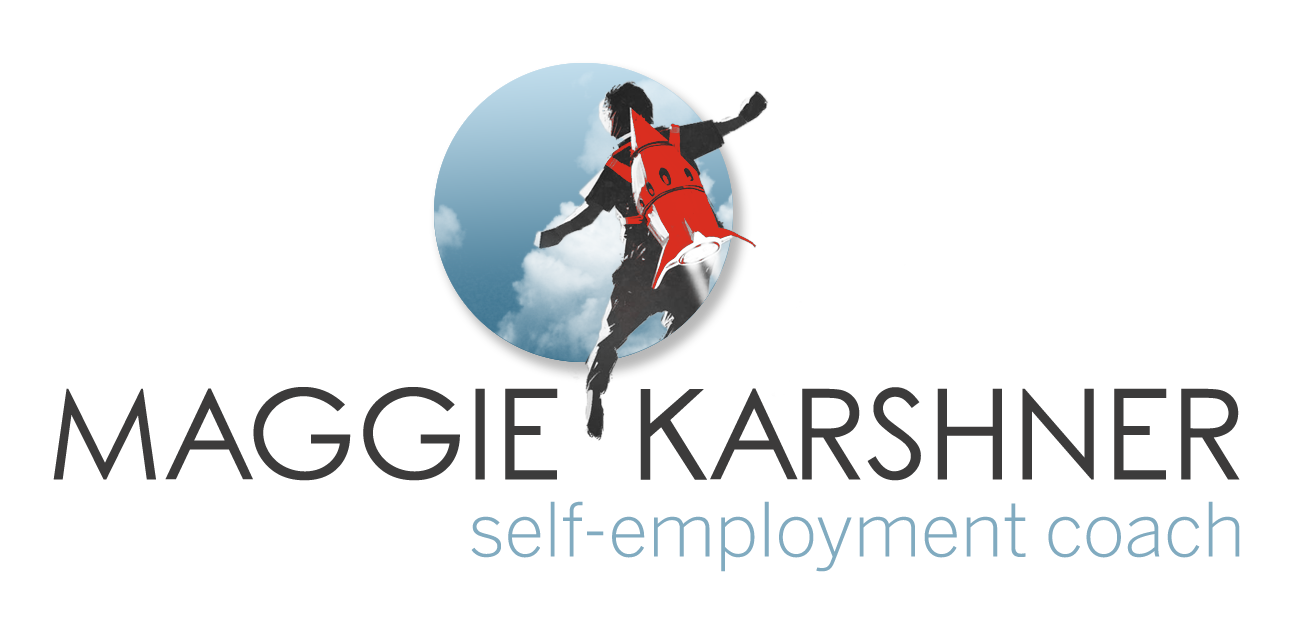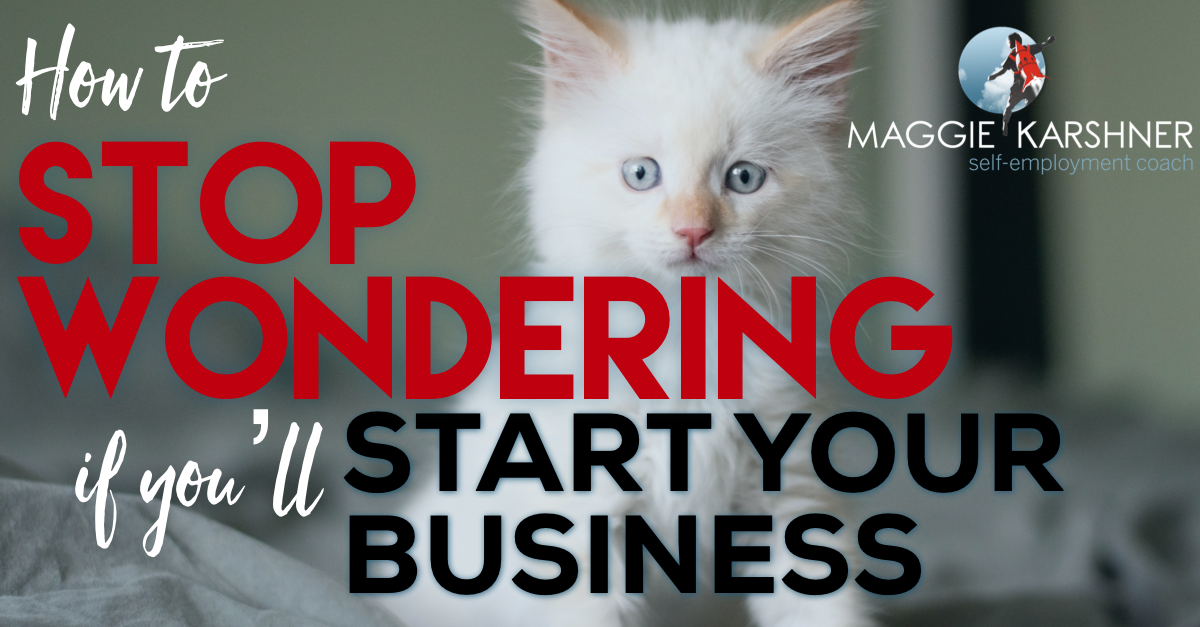How to Stop Wondering If You'll Start Your Business
/Image contains the title of this article overlayed on an image of a kitten with a startled expression.
Recently I got the chance to sit down and talk with Julia W from Bothell, WA and a mom of two sweet boys. I'd like to share her story because I think you might recognize yourself in it. Julia has spent her career working in early childhood development and put her career on pause when she became a mom. She has a passion for helping parents and children to interact more harmoniously. Her past jobs in this field were fulfilling and successful, but now she wants to be able to have time with her own kids.
She wants to contribute to society and have the sense of purpose that comes along with it, but not for 40 hours a week. Since employers tend to want someone in full-time positions, it makes sense that Julia might start her own business. This would let her focus on her passion, and strike her desired balance between family and career. Underneath this pragmatic and reasonable thought process, Julia's terror prevents her from starting her own business.
Julia and the many others like her, often don't achieve their dreams because they're frozen in fear and indecision. The next steps are unclear. The unknowns are far greater than the knowns, and Imposter Syndrome is a frequent visitor. Getting motivated is insufficient in the face of all these demons.
The solution to this quandary is clarity. Clear steps and goals help to illuminate the fears and doubts inside our minds that drag us to a standstill. When we can clearly see the fears and doubts then we can address them. Of course, this is easier said than done.
As a professional self-employment coach, let me bring you this clarity. Your starting point is just two things: how to be legit and how to get clients.
How to be Legit?
Businesses have a bit more legal and financial complexity than a single individual. If you've never formed a business before, then filing to become an LLC or getting a business license can seem like monumental tasks. The long list of tasks you do know about are few compared to the feared list of tasks you don't know about. Many people feel pressure when they're just starting out to do things "right" and ensure they don't get in trouble... without really knowing what trouble they could get into and who would "catch" them.
What Does Trouble Mean?
There are three key ways to "get in trouble:" laws/licenses, taxes, and public opinion. There are business ideas that are illegal. But I have yet to come across a self-employed business idea that's illegal. If you think "this is so amazing! why hasn't anyone ever done this before?!" then it might be illegal, so do some research and consult an attorney. Some professions require a license to be legal. And if you're in one of those professions you probably know all about it even before starting a business. Your industry's professional organization is a great resource for support on these topics.
You can get in trouble if you don't pay your taxes. And for the most part that involves fines, not jail time. Governments want their money, so taxes are one of the easier things to learn about (bureaucracy notwithstanding.) Check with your city, county, state, and federal governments about business licenses and tax filings. Not all governments dictate licenses or taxes, but that covers all your bases. Taxes are typically submitted quarterly or annually. Many governments will send you email reminders once you're on their radar. An easy way to save for taxes is to set aside 20% of everything the business brings in. I can't guarantee this will reflect your actual tax burden. Rather, it is a rule of thumb that will prevent you from sticker shock come April 15th.
Covering Your @$$ and Public Opinion
The above is all the ways an authoritarian big brother could wag its finger at you. And then there's the wild world of public opinion. Dissatisfied customers and internet trolls feel like a PR nightmare for small businesses. However, self-employed businesses oftentimes don't interface with a volume of customers or internet denizens that would lead to these problems. And an ounce of prevention is worth a pound of cure, so here's what you need to know:
First off, use excellent customer service and a level headed approach to social media communication. That prevents 99% of problems!
Choose a business entity (e.g. sole proprietor, LLC, S-corp, etc.) that affords you appropriate legal protection. By default, you're considered a sole proprietorship but that doesn't afford much legal protection. Do your homework and discuss with an attorney what would work best for your situation.
For added protection, look into buying business insurance.
Not for the Bourgeoisie
Operating a business is not legislated to be an elite process. This is not a doctoral dissertation; if anything it's more like an open-book test! (Ok, but you do have to look in a lot of different books to find all the answers!) It's unlikely that you'll "get in trouble." In reality, you'll spend far more time on minimizing your liability and tax burden. To do this, all you need is to form and maintain your business entity, and practice (or pay for) good bookkeeping.
Next Steps:
set this aside for now. "Is it possible to be legit?" has a known answer which is clearer in your mind now. You'll need a client before any of this is relevant. If it puts your mind at ease, research what you'll need to do once that golden "first client" materializes.
Bonus: For more support in this process check out my online class Making Your Business Legit
How to Get Clients?
A business cannot be successful without clients. And I'm not going to lie, this is the most anxiety inspiring part of becoming self-employed. This process involves deep internal investigations, paired with learning skills around self-promotion and sales that many find distasteful and nebulous. It pulls into the open any struggles you have around worthiness or value and requires you to face them. It's not for the faint of heart, but it's also not the fight most people expect it to be.
Starting a business does not have to turn you into a slimy salesperson. But building a successful business will require you to dig deep inside and face things you wouldn't otherwise have to. For those in love with emotional spelunking, we revel in this process of accepting ourselves in a more profound way. It is difficult but rewarding.
You've read articles outlining great tactics on how to get clients, and yet you don't put those into practice or they don't get results. A tactic is nothing without a strategy. In self-employment, the foundation of your strategy is yourself: the unique offering that only you can make. The internet is teeming with ideas but those ideas do nothing without harnessing your self-knowledge.
Knowing yourself is something you might have already put a lot of time into. Yet knowing yourself in the context of a business - some part of yourself or thing that you do that you sell to others - is probably new. This context comes with its own catch 22. To be compelling you must share the unique, vulnerable part of yourself. But to do so is scary and often tied up with our very identity. Your sense of self risks being under attack by strangers. But it will be under attack if your offering is not based in authenticity and vulnerability.
As you're dreaming your business into being, you'll be looking deep inside yourself for a compact little seed. This seed encapsulates everything you want to offer. As with a seed, it will be singular, and yet contain everything it needs to grow into a mighty tree. The seed will be thoroughly and essentially you, but will not take anything away from you. In this way, you are your business, and you are not your business. Your business (the seed) is just like you. And, if the seed/business fails to grow, then you are still you and still whole.
With that distinction, it's a lot easier to tackle learning about sales and marketing. They are just skills that will help you with your business. They are not some external indicator of if you are a failure.
Next Steps:
THIS is the key question: "Is it possible to get clients?" (e.g. how can I get ONE client?)
Bonus: Once you answer “Yes” to that question, move on to the next: "Is it possible to get enough clients?" (You don't need millions, so it's helpful to come up with a specific target number.)
Start this Learning Journey Now
After reading this I hope you've noticed how all these are learnable skills. In fact, you've probably had similar learning experiences already. If you've ever gotten a driver's license, then you've navigated a process of "legitimizing" yourself. If you've earned any degree then you've had to figure out how to complete the course work required. That is not dissimilar to learning how to promote your business.
Take a minute and think of a situation in which you didn't know how to do something? Even if your process was trial and error, learning did happen. The same is true when starting your own business. And like in other aspects of life, we can reduce trial and error by seeking out help in the expertise of others.
The kitten in this photo is wondering if you’ll start your business.





